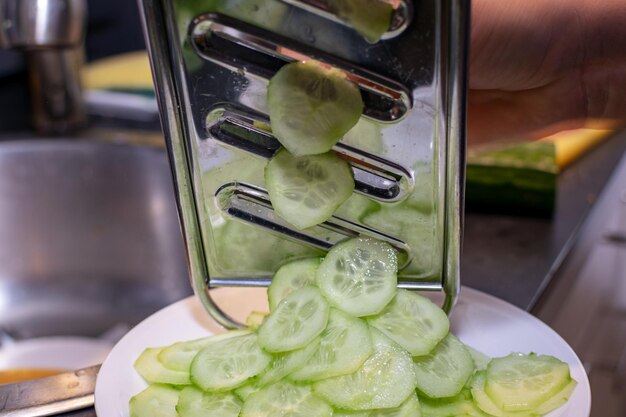Should You Refrigerate Cucumbers? A Complete Guide
Imagine biting into a crisp, refreshing cucumber slice on a hot summer day. The cool, crunchy texture feels perfect, right? But how did you store your cucumbers to keep them that fresh? This simple yet puzzling question often leaves many of us wondering: Should cucumbers go in the refrigerator? Let’s settle this debate once and for all. In this article, we’ll explore the best storage practices for cucumbers and how to enjoy them at their best. 🌿
Understanding Cucumbers: Nature's Cooling Vegetable
What Makes Cucumbers Unique?
Cucumbers, with their high water content, provide a refreshing and hydrating snack. As members of the gourd family, they thrive in warm climates, hinting at their preference for storage conditions. Yet, their delicate nature makes them susceptible to environmental changes, which can impact texture and taste.
Why Storage Matters
The way you store cucumbers can dramatically affect their quality. Improper storage can lead to cucumbers becoming mushy or developing undesirable flavors. Let’s delve deeper into the science of cucumber storage and why many experts have specific advice regarding refrigeration.
The Big Question: To Refrigerate or Not?
Refrigeration Pros and Cons
Benefits of Refrigeration:
- Prolonged Freshness: Refrigeration can extend the life of cucumbers, keeping them fresh for about a week.
- Crisp Texture: Cold temperatures help maintain that desired crispness longer.
Drawbacks of Refrigeration:
- Cold Damage: Cucumbers are sensitive to cold and can suffer from “chilling injuries,” leading to water-soaked spots or accelerated decay.
- Flavor Changes: Exposure to low temperatures can alter the flavor, sometimes making it less appealing.
Temperature Sensitivity
Cucumbers are sensitive to temperatures below 50°F (10°C). Exposure to such temperatures can cause cellular damage, often referred to as chilling injury. This is why cucumbers should ideally be stored at room temperature if you plan to consume them within a few days.
Storing Cucumbers Without Refrigeration
Room Temperature Viability
For short-term storage, cucumbers can comfortably sit on your kitchen counter. This is particularly feasible if you intend to use them within three days. Exposure to room temperature helps cucumbers maintain their flavor and texture without the risk of cold damage.
Ideal Conditions
Store cucumbers in a cool, dry area away from direct sunlight. A pantry or a shaded corner of the kitchen works well. You can also store them in a ventilated basket or crate that allows air circulation, preventing moisture buildup.
Best Practices for Long-Term Storage
Considering Partial Refrigeration
If you require longer storage:
- Partial Compromise: Store cucumbers in the refrigerator with precautions. Wrap them tightly in a paper towel and place them inside a perforated plastic bag. This method provides a balance of moisture and air circulation.
Checking Continuously
Monitor cucumbers for signs of spoilage such as soft spots or discoloration. Early detection can save a batch from going bad.
Pairing Cucumbers with Other Foods
Compatible Neighbors
Some fridge companions can speed up cucumber spoilage, while others complement well:
- Avoid Ethylene Producers: Keep cucumbers away from bananas, tomatoes, and melons. These emit ethylene gas, which accelerates ripening and spoiling.
- Good Pairings: Store cucumbers with other non-ethylene emitters like leafy greens or peppers.
Storing Cut Cucumbers
For leftover slices:
- Refrigerate Promptly: Use airtight containers to seal in freshness.
- Moisture Control: Add a layer of paper towel at the bottom of the container to absorb excess moisture.
Creative Uses and Tips for Cucumbers
Maximizing Flavor and Freshness
Following storage customization (refrigeration or room-temp storage), maximize cucumbers in culinary delights:
- Salads: Refreshing cucumber salads are a go-to choice. Experiment with simple seasoning for added zing.
- Infused Water: Add cucumber slices to water for a hydrating drink.
- Snacks: Pair with hummus or your favorite dip for a healthy snack.
Enhancing Shelf Life with Preservation
For those who wish to extend enjoyment beyond their fresh shelf life, consider pickling. Pickling cucumbers intensifies flavors and extends their life significantly.
Summary: Keeping Cucumbers at Their Best 🥒
Here’s a concise guide to ensure your cucumbers remain fresh and flavorful:
- Short Term/Room Temperature: Store on the counter for up to 3 days.
- Long Term/Refrigeration: Use with caution, wrapping cucumbers in a paper towel before placing them in a perforated bag.
Storage Do's & Don'ts:
✨ Do store in a cool, dry place if using soon.
🚫 Don’t store near ethylene-emitting fruits.
👉 Do check for spoilage signs quickly.
💧 Do keep cut cucumbers in sealed containers with paper towels.
In conclusion, the way you store cucumbers essentially depends on your consumption timeline. Understanding temperature sensitivities and storage environments will help you keep cucumbers fresh and ready for your next culinary creation. Happy storing!

